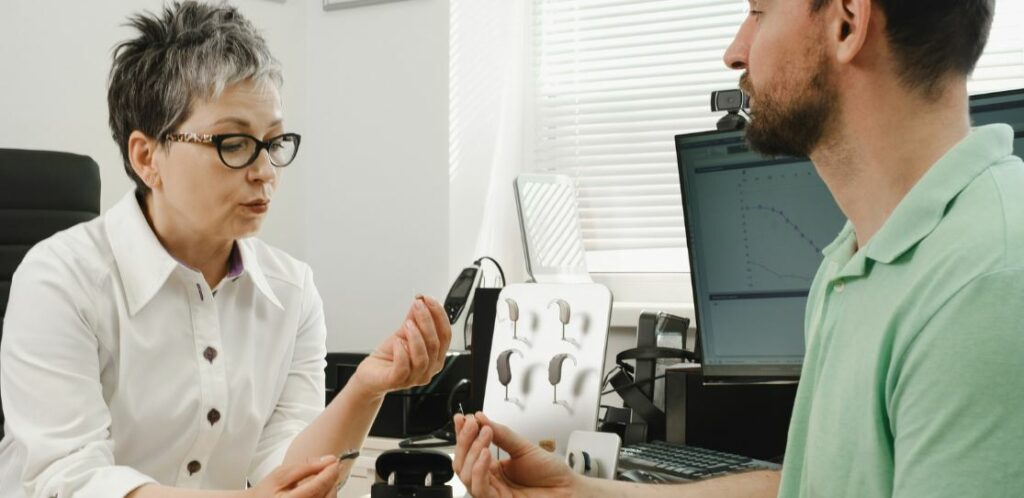Post-pandemic I have been wearing glasses more often, but in the warm days of summer, I needed sun protection. It was time for a pair of prescription sunglasses. A hearing loss friend told me about glasses with interchangeable tops—and one of the top options was sunglasses! Sold!
Ordering the glasses online was easy. The company contacted my doctor to verify my prescription and a few weeks later the new glasses with their handy sunglasses top arrived. The prescription was perfect, but the frames were loose, so the glasses kept sliding down my nose. Since I had purchased them online, there wasn’t a place to visit for a physical adjustment.
No problem. I went to my local eyeglass store and explained the situation. Despite the fact that they are direct competitors with the purveyor of my glasses, the optician happily adjusted them and told me to come back again if I needed another tweak. Wow, that was easy!
Would This Work for Hearing Aids?
As I happily walked home with my newly adjusted glasses, I wondered if it would ever be this easy for people to get the hearing aids they purchased one place adjusted at another. The answer probably varies depending on the type of hearing aid, the degree and complexity of the person’s hearing loss, and whether or not the devices have locked software.
A physical fit or exterior replacement part issue would be fairly simple for other practitioners to solve, especially for the standard behind-the-ear models with universal domes (custom earmolds would be more challenging). But would clinic owners agree to do it?
And what about the consumer? Most activities of this type are bundled into the cost of the hearing aids. Would consumers be willing to pay for services they had already paid for somewhere else?

The more questionable piece is the sound profile. The lenses of my glasses were fine and I’m not sure my friendly local optician would have been as eager to adjust those. But a tweak or two to a hearing aid program could be simpler, assuming the devices were unlocked so people other than the original seller have access.
Flexible device programming becomes a larger issue should someone with hearing aids move to a new place and need to transfer their hearing care to a clinician nearby.
The Pandemic May Have Pushed Us Closer
During the pandemic, hearing aid providers and users learned to be more flexible. Adjustments took place both in person and through telehealth. Post-pandemic, consumers learned to be more independent as self-fit and on-line purchasing options became more available. Unbundling fees has also been more readily discussed. These trends could help boost consumer access to easier hearing aid tweaks and adjustments in the future.
OTC hearing aids may also help push hearing aids into a more flexible provider model. I hope hearing care providers will choose to help consumers with these new devices, even if purchased elsewhere.
Will it one day be as easy to walk into a nearby clinic for a quick adjustment on my hearing devices as it was for me with my glasses?
It may take some time, but I certainly hope so.

Shari Eberts is a passionate hearing health advocate and internationally recognized author and speaker on hearing loss issues. She is the founder of Living with Hearing Loss, a popular blog and online community for people with hearing loss, and an executive producer of We Hear You, an award-winning documentary about the hearing loss experience. Her book, Hear & Beyond: Live Skillfully with Hearing Loss, (co-authored with Gael Hannan) is the ultimate survival guide to living well with hearing loss. Shari has an adult-onset genetic hearing loss and hopes that by sharing her story, she will help others to live more peacefully with their own hearing issues. Connect with Shari: Blog, Facebook, LinkedIn, Twitter.







